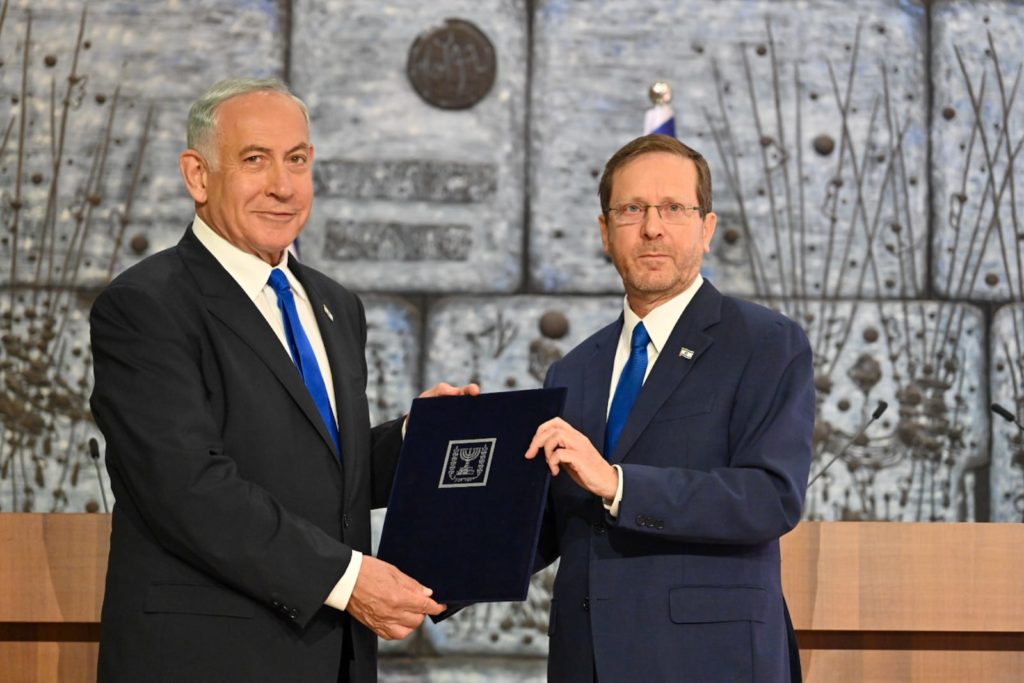
Benjamin Netanyahu on Sunday was formally tasked with forming Israel’s next government following the endorsement from a parliamentary majority of religious and right-leaning parties. But despite the common views held across the potential new government, Netanyahu promised to represent the entire country and not just the right-side of the political spectrum. “I intend to be the prime minister of all—of those who elected me, and of those who did not elect me. We are brothers and we are meant to live side by side,” said Netanyahu in a Hebrew Twitter post translated by Google. Netanyahu, who already holds the record for the most time serving as Israel’s premier, noted in his tweet that he is “very excited to have the right to form the government, no less than for the first time.”
Netanyahu’s unity vow echoed the call of Israeli President Isaac Herzog, whose role is to assign the task of forming a government following an election. “Israel’s citizens require a stable and functioning government. A government that serves all citizens of Israel, both those who supported and voted for it and those who opposed its establishment; a government that works on behalf of and for the sake of all shades of the Israeli mosaic, from all communities, sectors, faiths, religions, lifestyles, beliefs, and values, and that treats them all with sensitivity and responsibility,” said Herzog on Sunday when awarding the role to Netanyahu.
Despite receiving the task of forming a government with a stable-appearing coalition of legislators, Netanyahu is not guaranteed the premiership. He first must complete the sometimes impossible task of finalizing a ruling coalition by awarding government positions and making political commitments. Netanyahu has 28 days to form the new government, with the Herzog able to add a 14-day extension.
Netanyahu knows firsthand the risk he might not end up being the next prime minister, despite receiving an official opportunity to form a government. In 2019, Netanyahu had the support of parties representing 65 members of Israel’s parliament (known as the Knesset)—which is actually one more than he has in 2022. However, the endorsing parties could not ultimately agree on government formation efforts in Spring 2019, leading to a new round of elections later that year.
This time around, Netanyahu received the support from 64 Knesset members, but current Prime Minister Yair Lapid was backed by just 28 members. Another 24 Knesset legislators endorsed no one for the top post. In a separate tweet on Sunday also translated by Google, Netanyahu noted that “the people decided clearly in favor of establishing a government headed by me… We will do everything so that, with God’s help, it will be a stable and successful government, a responsible and dedicated government, which will work for the benefit of all the residents of the country without exception.”
The challenges facing Netanyahu aren’t just the typical ones for a prospective prime minister, either. He also faces corruption accusations that are being reviewed in the Israeli judicial system. However, Herzog—whose comments on Sunday were published by Israel—said it was already determined after a prior election that Netanyahu was nonetheless permitted to form a government as the legal process plays out.
“I am not oblivious, of course, to the fact that there are ongoing legal proceedings against Mr. Netanyahu at the Jerusalem District Court, and I do not trivialize this at all,” said Herzog. “Nevertheless, it is important to note that the Supreme Court has already expressed itself clearly on the matter of pending indictments against a member of Knesset nominated for the role of forming a government.”
Herzog, in his guidance to Netanyahu, said the country requires a government that “knows to lead a process of connection and unification.”
While a government representing all citizens is generally an ideal world-wide, Herzog said Israel’s circumstances demand it. “The weighty responsibility that rests on the shoulders of the Government of Israel, and especially on the person who heads it, is among the greatest and most complicated in the world,” said Herzog.
“…It is important that we remember: we, as a people, have no room for critical mistakes. Every government must behave with immense caution on matters of fateful importance for our existence, for the defense of our security, and for the preservation of our most fundamental contours as a Jewish and democratic state.”
Given Netanyahu’s extensive experience in leadership, Herzog noted he knows “well which most urgent issues and challenges are on the agenda, including threats both internal and external, alongside important opportunities.”
(By Joshua Spurlock, www.themideastupdate.com, November 13, 2022)
